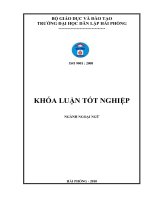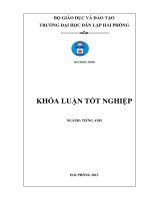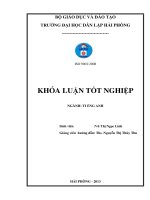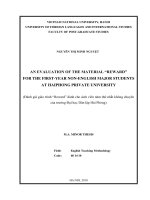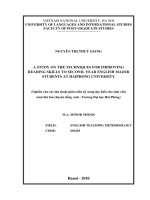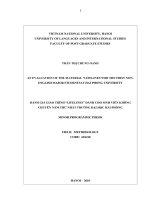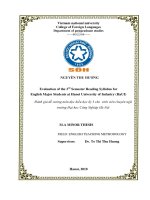A study on difficulties of bilingual learning and some suggestions for english major student at hai phong management and technology university
Bạn đang xem bản rút gọn của tài liệu. Xem và tải ngay bản đầy đủ của tài liệu tại đây (340.86 KB, 50 trang )
TRƯỜNG ĐẠI HỌC QUẢN LÝ VÀ CƠNG NGHỆ HẢI PHỊNG
KHĨA LUẬN TỐT NGHIỆP
NGÀNH : NGÔN NGỮ ANH – TIẾNG ANH THƯƠNG MẠI
Sinh viên
Giảng viên hướng dẫn: Ms. Nguyễn Thị Quỳnh Hoa
TRƯỜNG ĐẠI HỌC QUẢN LÝ VÀ CƠNG NGHỆ HẢI PHỊNG
A STUDY ON DIFFICULTIES OF BILINGUAL LEARNING
AND SOME SUGGESTIONS FOR ENGLISH MAJOR
STUDENT AT HAI PHONG MANAGEMENT AND
TECHNOLOGY UNIVERSITY
KHÓA LUẬN TỐT NGHIỆP ĐẠI HỌC HỆ CHÍNH QUY
NGÀNH: NGƠN NGỮ ANH – TIẾNG ANH THƯƠNG MẠI
Lớp
Sinh viên
Giảng viên hướng dẫn: Ms. Nguyên Thị Quỳnh Hoa
BỘ GIÁO DỤC VÀ ĐÀO TẠO
TRƯỜNG ĐẠI HỌC QUẢN LÝ VÀ CƠNG NGHỆ HẢI PHỊNG
--------------------------------------
NHIỆM VỤ ĐỀ TÀI TỐT NGHIỆP
Sinh viên: Phạm Thu Hương
Mã SV: 1512752013
Lớp: NA1091N
Ngành: NGÔN NGỮ ANH – TIẾNG ANH THƯƠNG MẠI
Tên đề tài: A study on difficulties of bilingual learning and some
suggestions for English major student at Hai Phong Management and
Technology University
NHIỆM VỤ ĐỀ TÀI
1. Nội dung và các yêu cầu cần giải quyết trong nhiệm vụ đề tài tốt nghiệp
………………………………………………………………………………….
………………………………………………………………………………….
………………………………………………………………………………….
………………………………………………………………………………….
………………………………………………………………………………….
………………………………………………………………………………….
2. Các tài liệu, số liệu cần thiết
……………………………………………………………………………………………………………………………………………………
……………………………………………………………………………………………………………………………………………………
……………………………………………………………………………………………………………………………………………………
……………………………………………………………………………………………………………………………………………………
…………………………………………………………………………………………………
3. Địa điểm thực tập tốt nghiệp
………………………………………………………………………………….
CÁN BỘ HƯỚNG DẪN ĐỀ TÀI TỐT NGHIỆP
Người hướng dẫn thứ nhất:
Họ và tên:.............................................................................................
Học hàm, học vị:...................................................................................
Cơ quan công tác:.................................................................................
Nội dung hướng dẫn:............................................................................
……………………………………………………………………….
…………………………………………………………………….
Người hướng dẫn thứ hai:
Họ và tên:.............................................................................................
Học hàm, học vị:...................................................................................
Cơ quan công tác:.................................................................................
Nội dung hướng dẫn:…………………………………………………
………………………………………………………………………..
Đề tài tốt nghiệp được giao ngày tháng
Yêu cầu phải hoàn thành xong trước ngày
Đã nhận nhiệm vụ ĐTTN Sinh viên
năm 20
tháng năm 20
Đã giao nhiệm vụ ĐTTN
Người hướng dẫn
Hải Phòng, ngày tháng năm 2020
TRƯỞNG KHOA
CỘNG HÒA XÃ HỘI CHỦ NGHĨA VIỆT NAM
Độclập - Tự do - Hạnhphúc
PHIẾU NHẬN XÉT CỦA GIẢNG VIÊN HƯỚNG DẪN TỐT NGHIỆP
Họ và ên giảng viên:
...................................................................................................
Đơn vị công tác:
........................................................................ ..........................
Họ và tên sinh viên:
Nội dung hướng dẫn:
.......................................... Chuyên ngành: ...............................
.......................................................... ........................................
............................................................................................................................Ti
nh thần thái độ của sinh viên trong quá trình làm đề tài tốt nghiệp
..............................................................................................................................................
..................... ..............................................................................................................................................
1. Đánh giá chất lượng của đồ án / khóa luận (so với nội dung yêu cầu đã đề
ra trong nhiệm vụ Đ.T. T.N trên các mặt lý luận, thực tiễn, tính tốn số liệu…)
..................... ..............................................................................................................................................
..................... ..............................................................................................................................................
..................... ..............................................................................................................................................
..................... ..............................................................................................................................................
..................... ..............................................................................................................................................
3.
Ý kiến của giảng viên hướng dẫn tốt nghiệp
Được bảo vệ
HảiPhòng, ngày … tháng … năm ......
Giảng viên hướng dẫn
(Ký và ghi rõ họ tên)
QC20-B18
CỘNG HÒA XÃ HỘI CHỦ NGHĨA VIỆT NAM
Độc lập - Tự do - Hạnh phúc
PHIẾU NHẬN XÉT CỦA GIẢNG VIÊN CHẤM PHẢN BIỆN
Họ và tên giảng viên:
..............................................................................................
Đơn vị công tác:
........................................................................ .....................
Họ và tên sinh viên:
...................................... Chuyên ngành: ..............................
Đề tài tốt nghiệp:
......................................................................... ....................
................................................................................................................................
........................................................................................................................
Phần nhận xét của giáo viên chấm phản biện
................... ..........................................................................................................................................
................... ..........................................................................................................................................
................... ..........................................................................................................................................
................... ..........................................................................................................................................
2.
Những mặt còn hạn chế
..........................................................................................................................................
................... ..........................................................................................................................................
................... ..........................................................................................................................................
................... ..........................................................................................................................................
3. Ý kiến của giảng viênchấm phản biện
Được bảo vệ
HảiPhòng, ngày … tháng … năm ......
Giảng viên chấm phản biện
QC20-B19
ACKNOWLEDGEMENT
First of all, I would like to send my sincere thanks to all my teachers at the
Faculty of Foreign Languages, Hai Phong Management and Technology University
who have handed me basic knowledge to complete this study.
Secondly, I wish to express gratitude to my supervisor – Mrs. Nguyen Thi
Quynh Hoa, the English teacher of Faculty of Foreign Language, who has always
been willing to give me valuable advices and suggestions in order that I can
complete this study successfully.
Thirdly, I am equally indebted to my classmates for their suggestions and
encouragements in the process of my study.
Last but not least, I would like to express my special thanks to my family
members who gave me their love, care, support and encouragement so that I could
accomplish my study.
Hai Phong, December 2020
Student
Phạm Thu Hương
TABLE OF CONTENT
ACKNOWLEDGEMENT
PART I: INTRODUCTION
1.
Rationale
2.
Aims of the study
3.
Research questions
4.
Methods of the study
5.
Design of the study
PART II: DEVELOPMENT
CHAPTER I: THEORETICAL BACKGROUND
1.
Bilingualism
1.1.
Defining
1.2.
Bilingual education – the reason it should be required
1.3.
The age which is suitable for bilingual learning
2.
Comparing bilingual to monolingual learning
3.
The objective and subjective influences on bilingual learning
3.1.
Objectivity
3.2.
Subjectivity
CHAPTER II: METHODOLOGY
1.
Sample and sampling
2.
Instruments
3.
Data collection
4.
Data analysis
CHAPTER III: DATA ANALYSIS, FINDINGS AND SUGGESTED SOLUTIONS
1.
Data analysis and findings
2.
Bilingual models are taught at Hai Phong Management and
Technology University
3.
Difficulties of bilingual learning at Hai Phong Management and
Technology University
3.2.
4.
The skills
Suggested solutions
4.1.
Write diary
4.2.
Reading
4.3.
Listening
4.4.
Set goals
PART III: CONCLUTION
SURVEY QUESTIONAIRE
REFERENCE
PART I: INTRODUCTION
1. Rationale
When the world is developing day by day, demand to expand
knowledge is more and more focused. Previously, when applying for jobs,
candidates with English abilities will be given priority. Nowadays, English
becomes a popular language over the world, knowing more than one
language (in addition to the mother tongue) is an advantage alongside other
skills.
Foreseeing develop trend, Hai Phong Management and Technology
University (HPU) has applied bilingual training to students for many yeas,
especially English major students. During many years of teaching, the
school and lecturers always change appropriate methods to improve
students' abilities. However, bilingualism is a new method of learning, so it
is unavoidable that there are difficulties in the learning process.
The topic “ A study on difficulties of bilingual learning and some
suggestions for English major student at Hai Phong Management and
Technology University” helps point out the difficulties on bilingual learning
of HPU English major students, thereby giving some suggestions to help
improve bilingual receptive. The other side of the coin is that not only
English major students but also other students can refer to improve learning
efficiency.
2.
Aim of the
study The research
aim at:
Find out some difficulties on bilingual learning of English
major student at Hai Phong Management and Technology University
Give some suggestion to help student overcome their problems
3.
Research questions
The students begin bilingual learning from second year to Autumn term of
final year at Hai Phong Management and Technology University, so the
study focus on answering following questions:
What is difficulties of bilingual learning for English major
student at Hai Phong Management and Technology University?
4.
Some suggestion to improve the problems?
Methods of the study
In order to achieve the aims of the study mentioned above, the quantitative
method (survey questionnaire) was used to collect information and evidence
for the study.
All the recommendations included in the study were based on the data
analysis.
5.
Design of the study
My graduation is divided into three parts:
Part I: Introduction is the introduction of my study including rationale, aims
of the study, research question, scope of the study, methods of study, and
design of the study.
Part II: Literature review consists of three main chapter: theoretical
background, methodology and data analysis, findings and suggested
solutions
Part III: This part is conclusion of the study
PART II: DEVELOPMENT
CHAPTER I: THEORETICAK BACKGROUND
1. Bilingualism
1.1.
Defining
Today, the definition of bilingualism is still unclear. Bilingual definitions range
from minimum fluency in two languages, to an enhanced level of proficiency that
allows a speaker to function and appear as a bilingual native.
"A bilingual person really knows both languages perfectly."
In my opinion, this is not entirely true. Because one of the main misconceptions
about bilingualism is that they are proficient in speaking, listening, writing, and
reading languages as well as having a perfect knowledge of their respective
cultures. In fact, bilingual people often don't speak both languages well, and that's
because they use each language in different contexts, activities, and domains. It can
spoil the confidence of bilinguals as they go through life thinking that they are not
bilingual and that something wrong happens to them if they are not equally fluent.
"The bilingual can be translated on the spot, otherwise, they are not real
bilingual".
Similar to the first misconceptions, I disagree. Obviously the local translation and
the speed of translation cannot tell if a person is truly bilingual or not. Even
monolingual ones, it's quite difficult sometimes. Because it is understandable to
spend a very short amount of time choosing the right word. In bilingual, it is the
same. Usually, this is understood by monolingians as a lack of language
proficiency. However, it has nothing to do with lack of proficiency. Sometimes the
simple word does not exist in the second language or the word is simple in
language A but it does not exist in language B. The reason is that each language is
learned and used in different situations, to Finding the word equivalent out of
context requires a lot of concentration and can take a bit of time to reach your
brain. This is the reason why bilingualism is not necessarily good at translating. (1)
Simply put, bilingualism is the ability to use two languages. However, identifying
bilingualism is a difficult problem because individuals with different bilingual
characteristics can be classified as bilingual. A person may describe himself as
bilingual but may only be able to communicate and communicate verbally. Others
can read fluently in two or more languages. A person can speak bilingual by
learning and using them at the same time (bilingual at the same time) or they can
become bilingual by learning a second language after their first. This is called
sequential bilingualism. Bilingual means different things to different people. (2)
1.2.
Bilingual education – the reason it should be required
There are so many reasons for learning the second language. Because “The limits
of my language mean the limits of my world.”– Ludwig Wittgenstein
Opening a new world. Starting to learn a new language means learning about this
cultural. Because bilingual means speaking with people in different language and
different cultural. Bilingual can use social codes and step into another culture. In
other words you are able to step into another culture. Rudolf Steiner a famous
pedagogue says: “Each language says the world in its own way”.
Better ability to focus. Bilinguals find it easier to focus and can avoid distractions
(Dr. Judy Willis, 2012) (3). Indeed, the part of the brain called the executive
function, which is used for staying focused has proven to be stronger in bilinguals.
Every time a bilingual speaks, both languages are actually active, and the brain has
to work to suppress one language while the other is being used. That mechanism
employs the executive function of the brain more regularly in bilinguals which
makes it become more efficient.
Intellectual Gymnastic. Learning another language stretches your mind
intellectually. People who are monolingual do not need to recognise sound patterns
and make inferences because they use a sound and a way of reasoning in this
language. Research even shows that learning a language would help delay
Alzheimer disease (Dr. Ellen Bialystok) (4).
In the same way, about the multitasking the executive function of the brain, which
gives bilinguals better cognitive control over information that allows them to
switch tasks. Bilingual kids can switch from one activity to another faster and are
better at doing multiple tasks at once than monolinguals (Ellen Bialystok, 1999) (5).
In my opinion, being bilingual means constantly switching from language A to
language B to explain thinking in a different way. It helps me to remember new
words in another language. Moreover, you have been exposed to two sets of sound
patterns rather than one. This gives you more chances to encounter known sounds
in the new language. All this combined makes learning an additional language
easier.
As Professor Clyne (6) says: “They bilingual have a better sense of the arbitrary
nature of words, and the difference between form and meaning.” Because people
who know more than one language have deeper appreciation of what is a language.
They know that there is more than one way to label a word and that a word can
have different connotations.
The classic concept of bilingualism is defined by Bloomfield (1933: 55 cited in
Chin and Wigglesworth, 2007: 5) as “native-like control of two languages”
whereas Mackey (1962: 52) defines it as “the ability to use more than one
language‟ and Weinreich (1963: 1) defines bilingualism as „the practice of
alternately using two languages”. Moreover, several classifications of individual
bilinguals are introduced in current academic books such as based on language
proficiency; the term „balanced bilinguals “refers to those who are equally
competent in two languages from birth, and the term „dominant bilinguals” refers
to those who are more confident in one language than another (Butler and Hakuta,
2006; Chin and Wigglesworth, 2007; Baker, 2011; Pavlenko, 2012).
(https://asianefl-
journal.com/wp-content/uploads/theses/MA-Dissertation-Akiko-Asada.pdf)
Finally, it is about job opportunities. Obviously, knowing more than one language
is not only how you are intelligence but also about what can you do with your job.
So, being bilingual means many doors are opening.
1.3.
The age which is suitable for bilingual learning
“Teaching young children a second language is beneficial in many ways”Advantage of bilingual brain (7) is the topic of a writing on website of Michigan
Stage University. The writing has shown that between the ages of 0-3, the brains of
young children are uniquely suited to learn a second language as the brain is in its
most flexible stage.
“Bilingual children that learn a second language from an early age sound like a
native in both.”
A study (2) conducted by a director of the cognitive neuroscience laboratory for
language and child development at Dartmouth College (Hanover) has
demonstrated that after the teen years, the brain changes and makes it extremely
challenging for an adult to learn a foreign language.
A study of 17,000 British children learning French at school has shown that
children who had started learning at the age of eleven performed better at second
language proficiency tests, compared to those that had started at around eight years
of age. So far, that particular study is the largest one of children learning a foreign
language in a classroom setting, ever. These findings were consistent with those of
other studies of Danish students learning English and Swiss children learning
French. Also, it has been found that adolescents who learn a foreign language
before they turn 15 have a better pronunciation of the second language, which is
described as almost native-like. Again, learning the second language as soon as, the
pronunciation skill also more developed.
On the other hand, children older than 15, as well as adults, are found to be better
at learning a new language than younger children. This is because there are
experiential and cognitive limitations in young children than adolescents and adults
don’t have, which allows them to learn faster.
In short, when we older get more difficult to learn second language and the best
time for learning a new language is before 18 years old.
2.
Comparing bilingual and
monolingual 2.1. Monolingual
2.1.1. Advantages
“Preserve the purity of Vietnamese”
Choose Vietnamese as an example to demonstrate the advantage of a monolingual.
What should we understand "purity"? It means state of not being mixed with
anything else, no residue, completely healthy. Clarity in Vietnamese is an open
matter, covering all things related to the use and influence of the Vietnamese. The
inherent nature of Vietnamese and how to use it properly is the purity of
Vietnamese. We use language as the leading means of communication between
people; for Vietnamese people, using Vietnamese is the most important means,
ensuring effective communication. Since the integration of our country began, new
phenomena gradually language appeared. New words have been formed to add to
concepts and semantics that were lacking in previous Vietnamese language. Along
with positive side, the negative side is also manifested with many "different" ways
of speaking and writing among young people, completely losing the inherent
identity of Vietnamese. One of many common phenomena that is mixing English
when communicating in Vietnamese. For this reason, the benefit of
monolingualism is that it is easier to preserve the purity of the mother tongue
So if there is an advantages, it is not having the phenomenon of mixing English
while communication.
2.1.2. Disadvantages
If your mother tongue is English or Spanish then you are lucky because they are
considered international languages. even so, in this age of global mobility and
borderless communication, you will be considered obsolete if you only know one
language.
"The limits of my language are the limits of my world"? - Ludwig Wittgenstein
In my opinion, Wittgenstein understood that a language contains walls. A language
restricts your thought and your mind to a specific format; any given language is
created to express the reality of a specific land or country. That’s why Inuits ( a
member of a Native American people who live in the areas of Alaska, Canada, East
of Serbia and Greenland) have so many words about snow and people living in a
desert have probably none. How can explain snow to someone that has never seen
and does not have a word for that? Describe it as cold water or as water that looks
like stone? whatever you do it will not be able to express to the other person the
reality correctly.
Imagine that Mohammed had actually had seen God. A great vision of God in all
his glory. How he can express that in a language of tribes who live in the desert
.People who their every day dictionary contain words of war, courage, riches, love
and division, etc. Inevitably Coran becomes a book that has a lot to do with wars ,
the opposite of war and division which is Peace and Unity. If Mohammed was born
few centuries later he would express everything in a more sophisticated way like
Avicenna did . But in his own age no one would understand God like that . They
were simple people who needed to believe in something they could understand .
The same with all religions or philosophies .Language is restricting them so
much .That two religions that actually speak about the same God but they cannot
recognize each other if it is not as translations in same language.
In short, monolingual is like an invisible wall, it limits human access to the outside
world and new sources of knowledge.
2.2.
Bilingual
2.2.1. Advantages
About the brain
The brain like any other muscle, it loves to function and in fact being fluent in two
or more languages is one of the best ways to keep them healthy and help prevent
degeneration or dementia. In fact, bilingual people have noticeable symptoms of
Alzheimer's disease ( five years later than people who are
monolingual. This is a significantly longer period of time than what modern
medicine can do. Surprisingly, this benefit is worth noting even for illiterate
people. It also boosts attention control. This means being able to focus on what is
relevant and disregarding what is not, because multiple-language speakers tend to
separate two different codes or languages by focusing their attention on one and
not letting the other interfere.
Bilingual also can greatly benefit the personal development since we were a child.
For instance, due to the different cultural influence and the higher level of
acceptance towards other cultures that is implied by bilingual. People who had
access to bilingual education will also learn much sooner that there are many
difference ways to live and that our cultural norms should not necessarily be
considered as a gold standard. Consequently, the overall personal development of
bilingual students maybe forested much more compared to regular student.
Knowing about two cultures
Many studies show that bilinguals score higher on tests, show more open-minded
and cultural acumen, and have a more relaxed outlook when looking at things from
a different perspective (cultural) others edge. Therefore, knowing bilingual is
considered to make people who are bicultural (if you use more than two languages)
have a great advantage in today's borderless world and have vital skills when
moving, getting acquainted with new cultures as well as new people.
Language helps us understand this world and can even influence the way we see
and describe the world, which is according to a recent study of German and
English speakers ( For example, there is no doubt that Finnish and
Arabic speakers can describe the world differently. However, Arabs rarely need 40
snow-related words like the Finns
( and have big differences
in the way an Arab describes experience about a wonderful land in winter. If a
person knows both Finnish and Arabic, these two relatively different descriptions
will likely lead to a broader view.
Job opportunities
For individuals, the benefits of bilingualism are mainly depending on industry,
location, and level of employment. For example, a study of Canada in 2010 found
bilingual workers had a 3 to 7% higher income than monolingual co-workers.
Workers who speak both the official languages of this country (English and
French) help them earn a higher income, even when they do not have to use a
second language while working. In the US, studies have shown that speaking a
foreign language can increase your salary (at least) by 1.5 - 3.8%, for the most
valuable is German, due to relative few of people can speak and German is so
importance in global trade. In India, the importance is even greater, English
speaker gets a 34% increase in income per hour worked.
Management that knows two or more languages is also increasingly valuable and
sought after: Employers and industry leaders think they are better equipped to
manage relationships and business teams across the board bridge.
2.2.3. Disadvantages
Being bilingual has a lot of advantages which includes better salaries, ability to
appreciate several cultures, interaction with more people. Recent studies have
shown that bilinguals possess better cognitive functions, have the ability to learn
more words and languages, process information in new ways, come up with
solutions to problems, good listening skills and improved communication skills.
The ability to analyse different aspects of a language (sounds, syntax and words).
The benefits of being bilingual are so immense that one cannot but wonder if there
are any disadvantages to being bilingual?
It might seem like there are only benefits, but don’t be deceived. There are certain
drawbacks to learning two languages ( or more than two languages). It is common
for children raised with two simultaneous languages to take longer to begin saying
their first words - Language Fluency Delay: Most times, speech delay is often
confused with language delay. According to research, it has been discovered that
speech delay is not as a result of bilingualism, however since an individual is
trying to learn or master two languages, he or she (especially children) may take a
longer time being fluent in these languages resulting in language fluency delay.
Monolingual children are usually compared with their monolingual age group,
without considering the fact that they have to learn twice the vocabulary of their
monolingual peers. In extreme cases, some children don’t speak at all. However, if
your child is in this category, don’t panic just yet, he should be able to speak in
time. This makes sense because they need to pay more attention and become
familiar with more vocabulary and different phonetics. Moreover, they tend to mix
up the languages even they do learn the languages more easily, it’s hard for them to
know when to use one or the other - Mixing Languages: It is a common sight to
see people start a sentence with one language and then finish it with another.
People tend to use whatever words they find easily to communicate and express
themselves. So, if they lack the words to use in a language, they simply fill it up
with words from another language. For instance, an English speaker that equally
speaks Italian, can speak in English and employ Italian grammar. Moreover, people
who are bilingualism's vocabulary is usually more limited. The total number of
words they know is greater than that of someone who is monolingual, but the
number of words in each language separately is not.
There are also some other disadvantages of bilingualism such as:
Reading and Writing: Speaking can be a natural process, reading and writing is
not, and it requires a lot of attention, time and effort. Except for an individual who
makes decisions and endeavors towards literacy in the secondary language, they
may not be able to read or write in the secondary language.
Receptive Bilingualism: Receptive bilingualism is the ability of an individual to
speak a particular language, understand another language but cannot speak. Mostly,
this is caused by a real need for the language, lack of exposure to that language.
Lack of vocabulary is a factor to consider when learning a receptive bilingual
language.
Prejudice: Bilingualism is not as celebrated as we think it is. Most people think of
them as special, but some consider them to be strange or bizarre individuals.
Immigrants, especially, look different and are somehow still connected with their
culture. They have a strange voice that makes them stand out and characterize them
differently. The kids can sometimes badly count against each other to attack
anyone else with them. Bilingual adults are considered proud people, who speak
only because trying to "show off" makes their friends jealous, especially if they've
tried learning the language before and fail. It is a huge challenge for bilinguals
trying to mingle with their peers.
